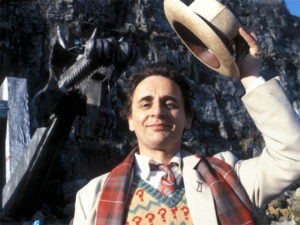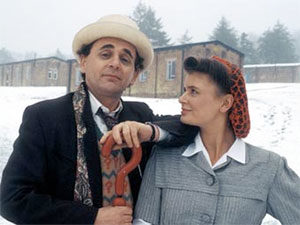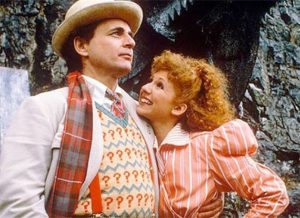Doctor Who In Perspective 1987–1996 (Part 1)
John Hussey continues his Classic Who look back, this time with the McCoy era.

“This is the Doctor, President Elect of the High Council of Time Lords, Keeper of the legacy of Rassilon, Defender of the Laws of Time, Protector of Gallifrey.”
After Colin Baker refused to return out of principle after his unfair firing, Sylvester McCoy took up the mantle in perhaps one of the most controversial eras of the show.
Things weren’t going to start well when there was an abrupt regeneration without any clear indication for the change. Another negative factor towards Sylvester’s first season was the poor production value (courtesy of the BBC restrictions) as well as a new production team that didn’t quite know where they wanted to go in terms of character and storyline. This resulted in the Seventh Doctor being written as a clownish character within his early days until being refined as a mysterious and manipulative person.
 ‘Time and the Rani’ saw the return of the Rani, ultimately causing the Sixth Doctor to regenerate (in a poor attempt to capture him) and then the Seventh Doctor suffered a severe case of amnesia and spent Part One and Two of the serial dazed and confused. He was easily manipulated by the Rani (despite her poor attempt at disguising as Mel Bush). Once the Seventh Doctor found his footing he was on his way. As stated above, his first season wasn’t well constructed and his characteristics were all over the place and didn’t translate well.
‘Time and the Rani’ saw the return of the Rani, ultimately causing the Sixth Doctor to regenerate (in a poor attempt to capture him) and then the Seventh Doctor suffered a severe case of amnesia and spent Part One and Two of the serial dazed and confused. He was easily manipulated by the Rani (despite her poor attempt at disguising as Mel Bush). Once the Seventh Doctor found his footing he was on his way. As stated above, his first season wasn’t well constructed and his characteristics were all over the place and didn’t translate well.
‘Paradise Tower’ had a decent narrative and it began to show the Seventh Doctor’s deeper and darker persona. Despite ‘Delta and the Bannerman’ being a dreadful serial (due to a bizarre styled narrative that didn’t feel like Doctor Who) the Seventh Doctor’s threat to the Bannerman was simply fierce. You felt the raw anger of the Time Lord, something that was somewhat new. We had seen the Doctor develop darker, alien natures within his fourth and sixth incarnation but his seventh enveloped more barbaric characteristics, deeper than the ones seen within the First Doctor.
 ‘Remembrance of the Daleks’ saw McCoy’s incarnation really reach new heights through the production team’s approach in tone and development. The Seventh Doctor became almost like a cold, god-like being that watched over the scenarios around him like it was an engineered chess game of his making. After leaving behind a mystical piece of Time Lord technology (called the Hand of Omega) after his first visit to Earth way back in ‘An Unearthly Child’ a death battle began between Dalek factions in order to claim it for their own gain. The Seventh Doctor pitted them against one another and manipulated their actions carefully in order to produce the set outcome of him using the device against them (ultimately bringing about Skaro’s supposed destruction and the Daleks supposed extinction). It was also interesting to hear his confrontation with Davros during a deleted scene where he confessed to being ‘more than an ordinary Time Lord’.
‘Remembrance of the Daleks’ saw McCoy’s incarnation really reach new heights through the production team’s approach in tone and development. The Seventh Doctor became almost like a cold, god-like being that watched over the scenarios around him like it was an engineered chess game of his making. After leaving behind a mystical piece of Time Lord technology (called the Hand of Omega) after his first visit to Earth way back in ‘An Unearthly Child’ a death battle began between Dalek factions in order to claim it for their own gain. The Seventh Doctor pitted them against one another and manipulated their actions carefully in order to produce the set outcome of him using the device against them (ultimately bringing about Skaro’s supposed destruction and the Daleks supposed extinction). It was also interesting to hear his confrontation with Davros during a deleted scene where he confessed to being ‘more than an ordinary Time Lord’.
Andrew Cartmel (script editor at the time) wanted the Doctor to become mysterious again. Cartmel threw in hints to give the impression that the Doctor held secrets about his past and that we knew very little about despite all this time of watching him onscreen. Another great hint into his past was shown within ‘Silver Nemesis’ when Lady Peinforte declared that she knew of his past during the Dark Times. These secrets were left unanswered for the sole purpose of leaving an air of mystery surrounding the Doctor.
A great moment that showcased the Seventh Doctor’s stern side was during ‘The Happiness Patrol’ where he tried pushing a sniper to shoot him:
The Doctor: “Of course he will. That’s what guns are for. Pull a trigger. End a life. Simple, isn’t it?'”
Sniper 1: “Yes.”
The Doctor : “Makes sense, doesn’t it?”
Sniper 1: “Yes.”
The Doctor: “A life, killing life.”
Sniper 2: “Who are you?”
The Doctor: “Shut up. Why don’t you do it then? Look me in the eye. Pull the trigger. End my life.”
This scene resulted in the sniper being rendered powerless and was unable to carry out his purpose.
 The strangest part about the Seventh Doctor’s darkness was his caring nature; despite coming across as extremely alien within his presence of all-seeing and all-knowing. ‘The Curse of Fenric’ was perhaps his worst narrative for being manipulative after playing a long game with the ancient evil Fenric. The Seventh Doctor had previously humiliated the creature through a game of chess and now it tried gaining its vengeance after devising a long game for the Time Lord to face, controlling the destinies of many different families in order to bring about the curse of Fenric. Even Ace was caught by this curse because, unbeknown to her, she aided in the escape of her grandmother and mother (who for reasons unknown is hated by Ace).
The strangest part about the Seventh Doctor’s darkness was his caring nature; despite coming across as extremely alien within his presence of all-seeing and all-knowing. ‘The Curse of Fenric’ was perhaps his worst narrative for being manipulative after playing a long game with the ancient evil Fenric. The Seventh Doctor had previously humiliated the creature through a game of chess and now it tried gaining its vengeance after devising a long game for the Time Lord to face, controlling the destinies of many different families in order to bring about the curse of Fenric. Even Ace was caught by this curse because, unbeknown to her, she aided in the escape of her grandmother and mother (who for reasons unknown is hated by Ace).
In order to defeat Fenric the Seventh Doctor destroyed Ace’s faith within him, stating that he knew she was ‘touched by evil’ from the very start (‘Dragonfire’) and that was the only reason he brought along a disruptive child. This shocking moment really damaged Ace but the Seventh Doctor quickly apologised after Fenric was defeated, stating he only did what he did in order to win and that he didn’t mean the negative things he stated about her. He then encouraged her to get over her fear of water.
The Seventh Doctor showed a kind heart and grew fond of Ace as they journeyed together. ‘Ghost Light’ showed his attempt at solving a terrible mystery behind Ace’s past; her fear of an old mansion. He deliberately took her back their within its own past in order to force her to confront the house and discover why she was scared of it. Though this act was cruel, it was in fact kind because the Seventh Doctor wanted Ace to be brave and in the end made her a stronger person and their bond as friends expanded.
 Unfortunately the Seventh Doctor’s era also ended abruptly due to the show being cancelled after his third season onscreen. The Classic Series ended on a high note though with serial ‘Survival’, which had Anthony Ainley’s final appearance as the Master and the Seventh Doctor delivering a fantastic end speech during the final scene. There was a hiatus for seven years (minus the short 30th Anniversary Special ‘Dimensions In Time’ in 1993) before the show returned as an American/British collaboration where Sylvester McCoy was brought back for the first act of the pilot television movie before regenerating into Paul McGann. It’s fair to say that McCoy has the most tragic regeneration due to the harsh circumstances involved.
Unfortunately the Seventh Doctor’s era also ended abruptly due to the show being cancelled after his third season onscreen. The Classic Series ended on a high note though with serial ‘Survival’, which had Anthony Ainley’s final appearance as the Master and the Seventh Doctor delivering a fantastic end speech during the final scene. There was a hiatus for seven years (minus the short 30th Anniversary Special ‘Dimensions In Time’ in 1993) before the show returned as an American/British collaboration where Sylvester McCoy was brought back for the first act of the pilot television movie before regenerating into Paul McGann. It’s fair to say that McCoy has the most tragic regeneration due to the harsh circumstances involved.
“We all have a universe of our own terrors to face.”
 Melanie Bush was first introduced part way through the events of ‘The Trial of a Time Lord’. She was given a rather strange introduction being shown within the Doctor’s future during the Sixth Doctor’s evidence. The Master then had another future version of her plucked out of time to aid the Sixth Doctor during the final act of the serial (being the first time they actually physically met). To date she is the only companion onscreen to not receive an introduction episode. Through Big Finish it is revealed that she had many off-screen adventures before the Sixth Doctor regenerated. Due to being unconscious at the time of the regeneration it was a little harder for her to accept the Seventh Doctor upon meeting him but the two of them added up becoming good friends.
Melanie Bush was first introduced part way through the events of ‘The Trial of a Time Lord’. She was given a rather strange introduction being shown within the Doctor’s future during the Sixth Doctor’s evidence. The Master then had another future version of her plucked out of time to aid the Sixth Doctor during the final act of the serial (being the first time they actually physically met). To date she is the only companion onscreen to not receive an introduction episode. Through Big Finish it is revealed that she had many off-screen adventures before the Sixth Doctor regenerated. Due to being unconscious at the time of the regeneration it was a little harder for her to accept the Seventh Doctor upon meeting him but the two of them added up becoming good friends.
It’s fair to say that she didn’t have to put up with any manipulative actions due to the Seventh Doctor still being undeveloped during their time together onscreen. Mel left through strange circumstances, opting to travel with Sabalom Glitz of all people, at the end of ‘Dragonfire’. Mel is one of my least favourite companions due to her poor writing and the fact that she constantly released a high-pitch shriek that almost caused my ears to bleed. I am told however that Big Finish solved these problems and gave Bonnie Langford some good material that allowed her positives to outshine the negatives.
 Ace’s beginning was unique because she didn’t start her journey from her original home due to her being transported to an alien world through an accidental chemistry experiment in her bedroom back on Earth. After Mel departed in ‘Dragonfire’ the Seventh Doctor offered her a place onboard the TARDIS. Her character was full of enthusiasm and always acted within any given situation. She was very rarely frightened by what she faced, and when she was it served as a great piece of character development. Ace has beat Daleks up with a baseball bat and killed Cybermen with a slingshot! She is also the only companion to date not to refer to the Doctor as ‘Doctor’ and instead called him ‘Professor’ which I think added in a special element to their friendship.
Ace’s beginning was unique because she didn’t start her journey from her original home due to her being transported to an alien world through an accidental chemistry experiment in her bedroom back on Earth. After Mel departed in ‘Dragonfire’ the Seventh Doctor offered her a place onboard the TARDIS. Her character was full of enthusiasm and always acted within any given situation. She was very rarely frightened by what she faced, and when she was it served as a great piece of character development. Ace has beat Daleks up with a baseball bat and killed Cybermen with a slingshot! She is also the only companion to date not to refer to the Doctor as ‘Doctor’ and instead called him ‘Professor’ which I think added in a special element to their friendship.
The Seventh Doctor had a massive amount of respect for her, despite sometimes coming across as a bit cold and unfeeling. They made, perhaps, the perfect pairing out of all the Doctor and companion relationships. What also added to her charm was her catchphrase ‘wicked’ and of course blowing stuff up with her homemade Nitro-9 explosive. Sadly due to the cancelling of the show her conclusion was never seen onscreen. Plans were made to have her join the Prydonian Academy on Gallifrey to train to become a Time Lord. Upon the Seventh Doctor’s return in ‘Doctor Who’ he was travelling alone with no reference as to what happened to Ace.
Join us for part 2 tomorrow.








